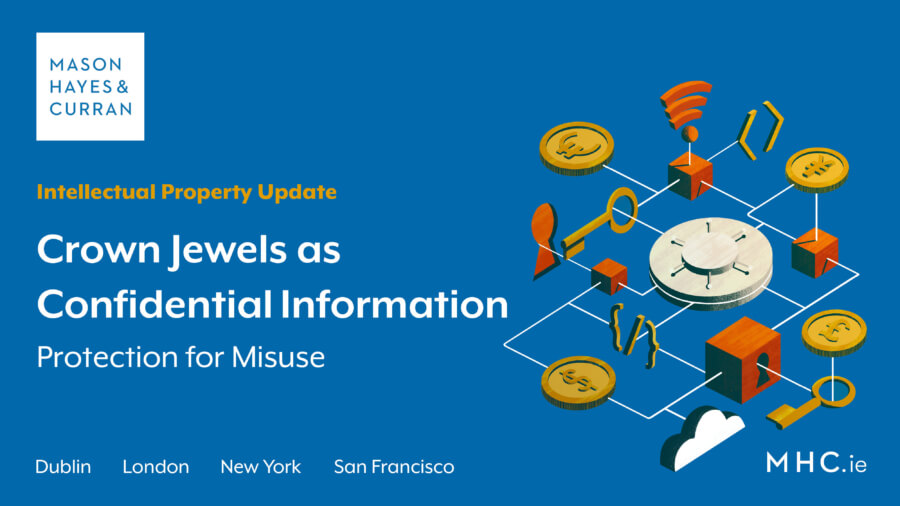
Irish law affords protection against the improper use of confidential information and permits remedies for its misuse in cases where the necessary requirements are met. Head of Intellectual Property, Gerard Kelly and Commercial Disputes partner, Gearoid Carey review the law relating to improper use of confidential information, what a party seeking to protect confidential information must establish and what remedies are available. They also explore the issues and complications that may arise.
A business may find itself in a situation where it believes someone has misappropriated its confidential information and is misusing it in order to benefit themselves. In such a scenario, what can that business do to protect itself and minimise the harm the misuse of the confidential information may cause? We consider the circumstances in which a party who believes their confidential information has been misused may be entitled to sue and what remedies to protect their position may be available to them.
Proceedings to protect confidential information?
As a general principle, under Irish law, a party whose confidential information has been misused is entitled to take action against a party who has wrongfully breached the confidence of the information involved. The class of party who may misuse confidential information is very broad and can include anyone who may be given access to confidential information for any number of reasons. Although one might conventionally think that employees, contractors or consultants are the most likely suspects when it comes to misuse, confidential and commercially sensitive information may legitimately be imparted to:
- Potential buyers of a company or business,
- Those trialing technology or intellectual property before entering into a formal agreement, or
- Participants in a tender or bid process
There is also a range of commercial agreements – for example, service agreements, license agreements, franchise agreements, distribution agreements, agency agreements - where a counterparty may need to have access to confidential information belonging to the other party in order to perform their own contractual obligations.
Very often, the obligation on a party to maintain the confidentiality of certain information will arise by way of a written agreement, such as those which would be entered into to address the types of scenarios mentioned above. These agreements usually make specific provision regarding limitations on the use of information considered to be confidential, which gives the party in possession of the confidential information great control over the level of protection to be imposed.
Carefully agreed terms
Where a confidentiality agreement exists, the question of whether the use of specific information involves a breach of the confidentiality obligations will be assessed by reference to the contractual terms agreed between the parties. In that context, having as well-drafted and enforceable a confidentiality agreement as possible is critical. A confidentiality agreement can avoid a multitude of expensive problems further down the line. Careful consideration should be given to the type of information that may be imparted which the disclosing party wishes to maintain as confidential. In addition, what constitutes confidential information should be clearly defined with strict limitations imposed on its use by the receiving party. Irrespective of the nature of the agreement, if the imparting party has any concerns about the implications of the confidential information being misused by the counterparty, a carefully drafted confidentiality agreement is a must.
Breach of confidence
However, the common law also recognises a duty of confidence as arising in certain circumstances. Accordingly, even if no formal confidentiality agreement exists, a breach of confidence action may still be pursued in the event of misuse of relevant information.
In order for a breach of confidence claim to be pursued at common law, the Supreme Court[1] has determined that:
- the relationship must be one which would give rise to an obligation of confidence regarding the information being imparted and
- the information being imparted would properly be regarded as confidential.
It has more recently elaborated on the applicable test at common law, such that the information must in fact be:
- Confidential or secret such that it has the necessary quality of confidence about it,
- Communicated in circumstances which impose an obligation of confidence or trust on the recipient and
- Wrongfully communicated by the recipient or by another person who is aware of the obligation of confidence.[2]
The common law duty of confidentiality does not distinguish between information held in electronic or hard copy form and protection is available irrespective of format.
Remedies
Where a party has misused confidential information to give themselves a competitive advantage in a new venture, there is a range of remedies which can be considered. Since confidential information loses its value once disclosed, the party asserting it as confidential will often seek to obtain an injunction to prevent an anticipated breach of the terms of the confidentiality agreement or breach of confidence pending trial of the action. As a result, confidentiality agreements may therefore often provide that damages will not be an adequate remedy in the event of a breach so as to improve the prospect of securing an injunction.
A claimant in an action concerning misuse of their confidential information will also likely seek damages or an account of profits arising from that misuse, as well as an order for delivery up or destruction of the confidential information involved. They may also seek a perpetual injunction to restrain the party from using the information after the trial of the action, regardless of whether an injunction was successfully obtained at the outset.
Limitations
However, there are limitations on the extent to which a party can seek to protect misuse of confidential information. It is generally accepted that information which is already in the public domain cannot be protected as being confidential. Well-drafted confidentiality agreements will often include other carve-outs for information required to be disclosed by law or by a court order. Although contractual confidentiality obligations are not subject to any maximum duration as a matter of Irish law, the enforceability of express contractual clauses which aim to restrain the use of confidential information indefinitely will be dependent on the facts. If the nature of the relationship is an employment one, as distinct from a contractor / consultancy one, or if the confidentiality agreement also contains a non-solicitation clause preventing the hire of employees who had access to the confidential information, they may be unenforceable. This is because they may be deemed an unreasonable restraint of trade. These are essential factors to be considered and addressed in drafting any confidentiality agreement.
Cases involving misuse of confidential information are also notoriously difficult to prove. Unsurprisingly, parties who have misappropriated confidential information are unlikely to make the misappropriation obvious and will take steps to ensure there is no record or paper trail to prove what they have done. Accordingly, even on discovery it is unlikely that there will a smoking gun to definitively determine the case in favour of the plaintiff. Success may be dependent on the weight of circumstantial evidence and the evidence of one or more experts in the relevant field.
It is also worth noting that in litigating a claim relating to confidential information, where one or more of the parties may claim that materials to be discovered may involve highly commercially sensitive material and constitute trade secrets, the court may impose a confidentiality club for certain of those materials. This will typically involve the relevant materials only being accessible to a party’s legal representatives, and / or limited officers of the company, and then only subject to strict undertakings. Being precluded from accessing or reviewing certain materials can pose its own challenges for a client when seeking to give instructions regarding the case, whether to their lawyers or expert(s).
Conclusion
Ultimately, a party which believes that its confidential information has been misappropriated and is being misused to benefit the party who misappropriated it can bring a claim for misuse and may obtain one or more of a range of available remedies. Although these cases are not straightforward, a carefully drafted suite of confidentiality obligations should make protecting confidential information much easier than would otherwise be the case.
For more information and expert advice on bringing such claims, contact a member of our Intellectual Property team.
The content of this article is provided for information purposes only and does not constitute legal or other advice
[1] House of Spring Gardens v Point Blank Limited [1984] IR 611
[2] Mahon v Post Publications Ltd [2007] 2 ILRM 1








